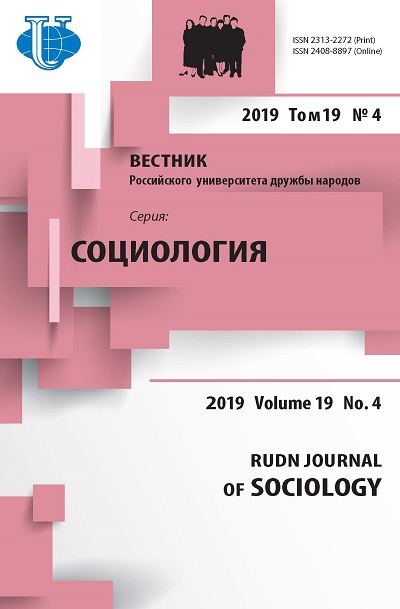Social dimension of students’ problems under the development of the contemporary university infrastructure
- Authors: Puzanova Z.V1, Larina TI1
-
Affiliations:
- RUDN University (Peoples Friendship University of Russia)
- Issue: Vol 19, No 4 (2019)
- Pages: 800-813
- Section: Surveys, experiments, case studies
- URL: https://journals.rudn.ru/sociology/article/view/22099
- DOI: https://doi.org/10.22363/2313-2272-2019-19-4-800-813
Cite item
Full Text
Abstract
Improving the quality of students’ life is an important task for every university and the educational system as a whole, which fits into the aims of the studies of the social dimension of students’ life. To solve this task, the study of students’ problems is a priority, while the second step can be the creation of university structures that would solve these problems effectively. The article presents an ideal model of the consulting center that can solve such problems. The authors conducted four focus groups in the RUDN University with students of different courses from different countries, and used projective techniques and group discussions to identify models of the consulting center, departments that it should consist of, and qualities of employees working in these departments. The general model of the consulting center includes an information department as its ‘core’ responsible for the distribution of students’ requests to necessary departments; IT department (site, corporate mail, etc.); department of social support (scholarships, financial support, etc.); residence department (registration, dormitory, etc.); department of science and education (grants, competitions, etc.); student committee (leisure). The students prefer to receive all necessary information online, by phone and also in person. The preferred social network for information is Facebook - for foreigners - and VK (Vkontakte) - for Russian students. The students also mentioned three main languages for distribution of information - Russian, English and Chinese. The focus-groups allowed to find out that although some necessary units designed to solve students’ problems already exist, they do not actually solve them due to bureaucratic or other reasons. Therefore, the proposed model of the consulting center can be an effective management solution ‘from the bottom’ that would help the university to communicate with students and to understand their real needs.
About the authors
Zh V Puzanova
RUDN University (Peoples Friendship University of Russia)
Author for correspondence.
Email: puzanova-zhv@rudn.ru
доктор социологических наук, профессор кафедры социологии, заведующая Социологической лабораторией
Miklukho-Maklaya St., 6, Moscow, Russia, 117198T I Larina
RUDN University (Peoples Friendship University of Russia)
Email: larina-ti@rudn.ru
кандидат социологических наук, старший преподаватель кафедры социологии
Miklukho-Maklaya St., 6, Moscow, Russia, 117198References
- Konsultatsionny tsentr pri Tikhookeanskom gosudarstvennom universitete [Consulting Center of the Pacific State University]. URL: http://pnu.edu.ru/ru/students/consulting-center (In Russ.).
- Mezhkulturnoe vzaimodeystvie v polietnichnoy molodezhnoy srede: sotsiologichesky podkhod [Intercultural Interaction in the Multi-Ethnic Youth Environment: A Sociological Approach]. Moscow; 2012 (In Russ.).
- Molodezh v sovremennom obshchestve: problemy i perspektivy [Youth in the Contemporary Society: Challenges and Prospects]. Moscow; 2014 (In Russ.).
- Narbut N.P., Trotsuk I.V. Strakhi i opaseniya rossiyskogo studenchestva: vozmozhnosti empiricheskoy fiksatsii [Fears and concerns of Russian students: Possibilities of the empirical study]. Teoriya i Praktika Obshchestvennogo Razvitiya. 2014; 2 (In Russ.).
- Narbut N.P., Trotsuk I.V. Tsennostnye orientatsii i sotsialnoe samochuvstvie studenchestva (rezultaty issledovatelskogo proekta) [Value Orientations and Social Well-Being of Students (Results of the Research)]. Moscow; 2017 (In Russ.).
- Perederiy V.A., Skripnichenko L.S. Issledovanie predstavleniy Kubanskogo studenchestva ob upravlencheskoy deyatelnosti: spetsifika i osnovnye kharakteristiki [The study of the Kuban students’ representations of management: Specifics and basic characteristics]. Obshchestvo: Sotsiologiya, Psikhologiya, Pedagogika. 2018; 2 (In Russ.).
- Puzanova Zh.V., Narbut N.P., Larina T.I., Antonova L.A. Konteksty mezhkulturnogo vzaimodeystviya v vysshey shkole [Contexts of intercultural interaction in the high school]. Politicheskie Issledovaniya. 2018; 4 (In Russ.).
- Trotsuk I.V., Sukhoverova D.V. Korporativnaya kultura kak instrument povysheniya konkurentosposobnosti vuza [Corporate culture as a tool to improve the competitiveness of the university]. Vysshee Obrazovanie v Rossii. 2018; 11 (In Russ.).
- Tsentr po rabote so studentami i vypusknikami pri NIU VShE v Permi [Center for Students and Graduates of the Higher School of Economics in Perm]. URL: https://perm.hse.ru/upr/stal (In Russ.).
- Sharshov I.A., Makarova L.N., Borzykh I.N. Studencheskoe samoupravlenie v kontekste professionalnogo vospitaniya studentov: formy organizatsii i kriterii otsenivaniya [Student self-government in the context of the professional training: Organizational forms and assessment criteria]. Vestnik TGU. 2017; 6 (In Russ.).














